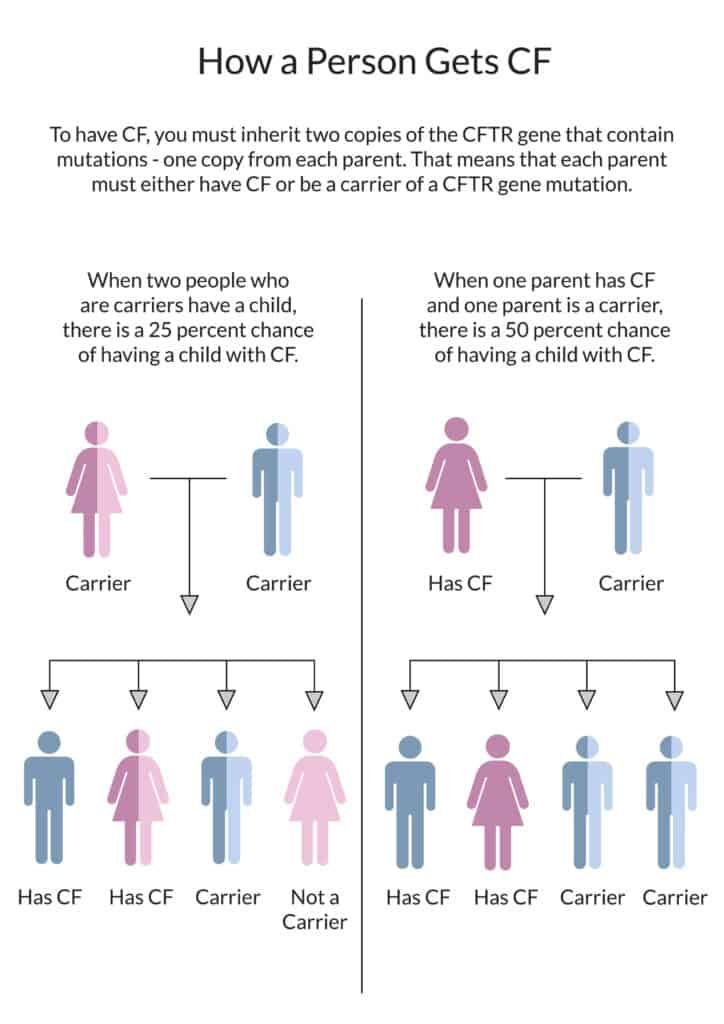Have you ever wondered if cystic fibrosis is contagious? With the ongoing COVID-19 pandemic, many of us have become familiar with the '6-feet rule' to prevent the spread of the virus. But does the same rule apply to cystic fibrosis? Let's discover the facts and myths surrounding this chronic disease and the truth.
Introduction
Cystic fibrosis is the most common lung disease in children. Many individuals with this condition also have digestive issues.
Cystic fibrosis is an inherited disease characterized by the accumulation of sticky mucus that may damage organs in the body.
The severity of the disease and its features vary in different individuals.
Cystic fibrosis is more common in white newborns and less common in other ethnic groups.
In this article, let’s understand more about cystic fibrosis, its symptoms, and its genetics.
Overview Of The Condition
Mucus is routinely produced by certain cells in the body and is thin and slippery.
It is most often found lining the airways, digestive tract, and reproductive system.
However, in cystic fibrosis, the mucus is abnormally thick and sticky and tends to clog the airways.
This results in breathing problems and an increased tendency to develop bacterial infections in the lung.
Coughing, wheezing, and inflammation are common in people with cystic fibrosis.
When inflammation becomes chronic (long-lasting), it causes scar and cyst formation in the lungs.
The CFTR Gene
Mutations (abnormal changes) in the CFTR gene are said to cause cystic fibrosis.
The CFTR or CF transmembrane conductance regulator gene provides instructions for making a protein.
This protein acts like a channel to transport negatively-charged chloride ions across the cell.
Mutations in the CFTR gene disrupt the chloride ion transport, preventing them from regulating water and chloride ion movement across the cell membranes.
This results in the production of mucus that is thick and sticky that clogs the airways and other ducts.
Symptoms Of Cystic Fibrosis
Signs and symptoms in children with classic cystic fibrosis are:
- Failure to thrive as they are unable to gain weight despite a good appetite
- Trouble in breathing
- Loose, oily stools
- Recurrent wheezing
- Frequent lung infections
- Recurrent sinus infections
- Nagging cough
- Slow growth
Respiratory signs and symptoms in people with atypical cystic fibrosis are:
- Chronic sinusitis
- Breathing problems like chronic obstructive pulmonary disease (COPD)
- Presence of nasal polyps
- Frequent bouts of pneumonia
- Dehydration
- Diarrhea
- Pancreatitis
- Unintended weight loss
- Fertility issues
How’s Cystic Fibrosis Inherited?
Cystic fibrosis is inherited in an autosomal recessive pattern.
This means an individual must have both copies of the defective CFTR gene to develop this condition.
Is Cystic Fibrosis Contagious?
Most people with cystic fibrosis are asked to keep at least a 6-feet distance between themselves and anyone who is sick around them.
However, this is not because cystic fibrosis is a contagious disease.
Cystic fibrosis is an inherited genetic disorder.
Why 6-Feet Apart?
In people with cystic fibrosis, the thick and sticky mucus in the lungs and the airways trap bacteria that can cause infections.
These infections can be dangerous or life-threatening to people with cystic fibrosis.
For this reason, people with cystic fibrosis are asked to stay at least 6-feet apart from people who are sick.
People with cystic fibrosis must also stay away from others with the condition.
6 feet distance is a globally followed rule because that is how far germs can travel when a person sneezes, coughs, or speaks.
FAQS
- Can Someone With Cystic Fibrosis Kiss Someone With Cystic Fibrosis?
Two people with cystic fibrosis must stay away from each other or maintain a 6-feet distance between themselves.
To prevent cross-infections between cystic fibrosis patients, it is recommended that they must not allow any bodily contact, including kissing, with each other.
- Why Can't Cystic Fibrosis Patients Be Near Each Other?
The respiratory tract, including cystic fibrosis patients' lungs, carries infection-causing bacteria.
When two people with this condition are close to each other, they stand a chance of getting infected by the other in case they are carrying bacteria.
Since respiratory infections can be dangerous or even life-threatening for cystic fibrosis, two people with this condition cannot be near each other.
Summary: Is Cystic Fibrosis Contagious?
- Cystic fibrosis is an inherited genetic condition characterized by the production of thick, sticky mucus in various organs of the body.
- People with cystic fibrosis tend to have a chronic cough, wheezing, inflammation, and an increased risk of developing respiratory infections.
- Mutations in the CFTR genes are a proven cause of cystic fibrosis.
- Symptoms of classic cystic fibrosis include difficulty breathing, loose stools, nagging cough, and frequent lung and sinus infections.
- Symptoms of atypical cystic fibrosis include chronic sinusitis, breathing difficulty, dehydration, diarrhea, and frequent bouts of pneumonia.
- Cystic fibrosis is inherited as an autosomal recessive pattern.
- Since people with cystic fibrosis are sensitive to respiratory infections, they must stay away from others with the condition and keep a 6-feet distance from the sick.
References
- https://www.emilysentourage.org/top-5-things-you-probably-dont-know-about-cystic-fibrosis/
- https://www.cff.org/get-involved/five-feet-apart
- https://www.healthline.com/health/is-cystic-fibrosis-contagious
- https://ada.com/conditions/cystic-fibrosis/
- https://cystic-fibrosis.com/clinical/6-foot-rule
- https://my.clevelandclinic.org/health/diseases/9358-cystic-fibrosis
- https://medlineplus.gov/genetics/condition/cystic-fibrosis/





